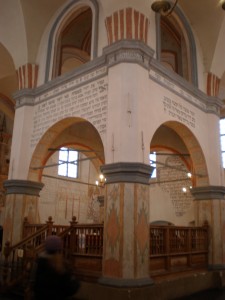Musings from Students of the Pardes Institute of Jewish Studies in Jerusalem
Posted on January 22, 2012 by Leah Stern
Hi Pardesians and World,
On Friday morning at 4:30 AM, I arrived back from Poland with my fellow Pardesians. Though we are happy to be back in Israel and are looking forward to the coming semester, we continue to process and ask questions about our experience in Poland.
The first experience I would like to share with you is about our first stop in Poland in the small town of Tykochin. After arriving in Poland, we chose not to begin our day in Warsaw, in a big city. We drove 2.5 hours from Warsaw to the tiny town of Tykochin, or as it was known to the Jews at Tyktin. The city had a huge Jewish community before the war. We went to the Tyktin synagogue where we saw the bimah with a domed canopy over it representing the marriage of God and the people of Israel that occurs when we read from the Torah. L’cha dodi and other prayers of Kabbalat Shabbat were written on the walls because they weren’t yet in the siddur- Kabbalat Shabbat did not reach Europe until  the 16th century. In other words-the shul and the community of Tykochin predated the creation of Kabbalat Shabbat! The shul was beautifully constructed and ornamented, one of only 4 remaining baroque-style shuls. We also saw the house of a melamed (a teacher who taught cheder to boys), and the town rynek, the marketplace. It was snowing and everything was white and beautiful. At the center of the rynek stood a statue and the church stood on one edge of the rynek. We then started to learn about how happened to the Jews of Tykochin. They were told to round up in the town square one morning by the Nazis. The Jewish community debated if they should follow orders or if there should be some kind of response. In the end, they followed orders.
the 16th century. In other words-the shul and the community of Tykochin predated the creation of Kabbalat Shabbat! The shul was beautifully constructed and ornamented, one of only 4 remaining baroque-style shuls. We also saw the house of a melamed (a teacher who taught cheder to boys), and the town rynek, the marketplace. It was snowing and everything was white and beautiful. At the center of the rynek stood a statue and the church stood on one edge of the rynek. We then started to learn about how happened to the Jews of Tykochin. They were told to round up in the town square one morning by the Nazis. The Jewish community debated if they should follow orders or if there should be some kind of response. In the end, they followed orders.
We then got on the bus and drove out of the town into the forest to find out what happened to the Jews of Tykochin. We were all silent as the bus drove as down a dirt road into the forest. We got off and walked on a path deep into the forest. We finally arrived at a clearing in the forest. Before Levi told us the rest of the story, we all knew what we were looking at: mass graves. Almost the entire town of Tykochin within two days were loaded onto trucks, driven into the forest, forced to strip naked, pushed into pits, and machine gunned down until there was no sign of life. After hundreds of years of rich, vibrant Jewish life in Tykochin, in two days it was destroyed.
Yet, I felt the story of the Jews of Tykochin wasn’t over as I stood in the snowy forest. I’d like to share the journal entry I wrote at the graves of the Jewish community of Tykochin in the Lupachowa Forest:
The air is charged here with something.
The dead are present.
I felt their souls dancing above the ground, coming to greet us.
Dancing in the enchanting snow, softly falling in the silent forest.
I felt aware of the numbness of my heavy limbs.
There is life here.
The dead have not yet departed.
To thank us
To show us gratitude.
The Jews of Tyktin may be underneath the snowy ground,
But their souls will dance amongst us forever.
Standing there in the forest, I knew that the story of the Tykochin Jews was not over. They were still and are present with us. They guide our desire to live meaningful Jewish lives and to continue our tradition. And they will be there to guide us, our children, and our children’s children. Their story is not over yet. And neither is ours.
Pardes trips to Poland are run in partnership with Heritage Seminars. The Claims Conference has provided trip scholarships for qualifying Pardes participants, as well as subsidies for program components directed at Jewish educators.
